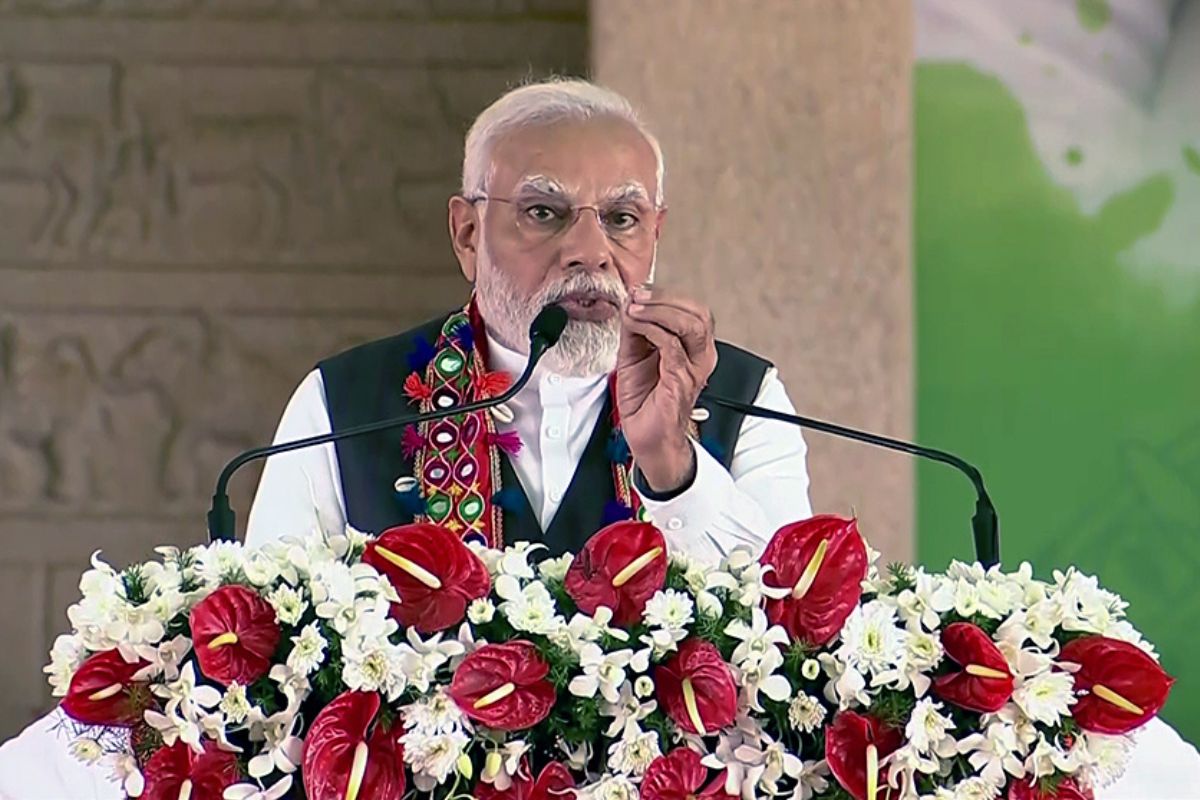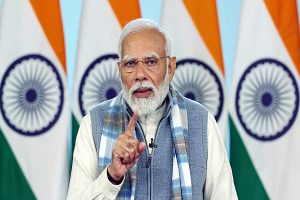Prime Minister Narendra Modi on Thursday laid the foundation stone and dedicated various developmental projects related to irrigation, drinking water and a National Highway in Kodekal, Yadgir, Karnataka.
The projects include the foundation stone of the Yadgir multi-village drinking water supply scheme under the Jal Jeevan Mission and a 65.5 km section (from Badadal to Maradagi S Andola) of the Surat-Chennai Expressway NH-150C, and inauguration of the Narayanpur Left Bank Canal–Extension Renovation and Modernisation Project (NLBC–ERM).
Addressing a gathering on the occasion, the prime minister highlighted the love and support of the people of Karnataka and said it has become a source of great strength. Throwing light on the rich history of Yadgir, Mr Modi said the ancient fort of Rattihalli is a symbol of the capabilities of the people of the region down the ages and reflected their culture and traditions.
He also mentioned the heritage of the great king Maharaja Venkatappa Nayak whose idea of swaraj and good governance was noted all over the country. “We all take pride in this heritage”, the prime minister affirmed.
Referring to the projects related to roads and water dedicated or for which the foundation stone was laid today, the prime minister said these will provide massive benefits to the people of the region. The Surat-Chennai Corridor’s Karnataka portion also saw the start of work today which will enhance ease of living and help employment and economic activity in the region including Yadgir, Raichur and Kalburgi.
Modi praised the state government for development work in northern Karnataka. He said the coming 25 years are ‘Amrit Kaal’ for the country and for every state.
“We have to create Viksit Bharat during this Amrit Kaal. This can happen only when every person, family and state gets associated with this campaign. India can be developed when the life of the farmer in the field and the entrepreneur is improved. India can be developed when there is good crop, and factory output also expands. This will need learning from the negative experiences and bad policies of the past,” he said.
Giving the example of Yadgir in northern Karnataka, the prime minister lamented the backwardness that prevailed in the region in the path of development. Even though the region had the capability, he observed the past governments had absolved themselves just by declaring Yadgir and other such districts as backward.
He recalled the time when the ruling governments of the past indulged in vote-bank politics and did not pay heed to basic infrastructure like electricity, roadways and water. Highlighting the priorities of the present government, the prime minister remarked that its focus is solely on development and not vote-bank politics.
“Even if one district in the country lags behind on the parameters of development, the country cannot become developed,” he said and noted that it was the present government that addressed the most backward regions on priority and initiated the hundred aspirational villages campaign including Yadgir.
The prime minister also noted the emphasis on good governance and development in these regions and informed that Yadgir has vaccinated 100 per cent of children, the number of malnourished children has gone down significantly, all villages of the district are connected via roads and availability of common service centres in gram panchayat to provide digital services.
“Be it education, health or connectivity, Yadgir has been among the top 10 performers of the aspirational districts programme”, the prime minister remarked while congratulating the public representatives and district administration for their remarkable achievements.
Giving examples of the work accomplished in the “double engine government,” Modi noted that when the Jal Jeevan mission began three and a half years ago, only three crore rural families had piped water connection out of eighteen crore rural families.
“Today that number has gone up to eleven crore rural families. Out of these, 35 lakh families are from Karnataka, he said, adding that the coverage of water per household in Yadgir and Raichur is higher than the overall average of Karnataka and the country.












